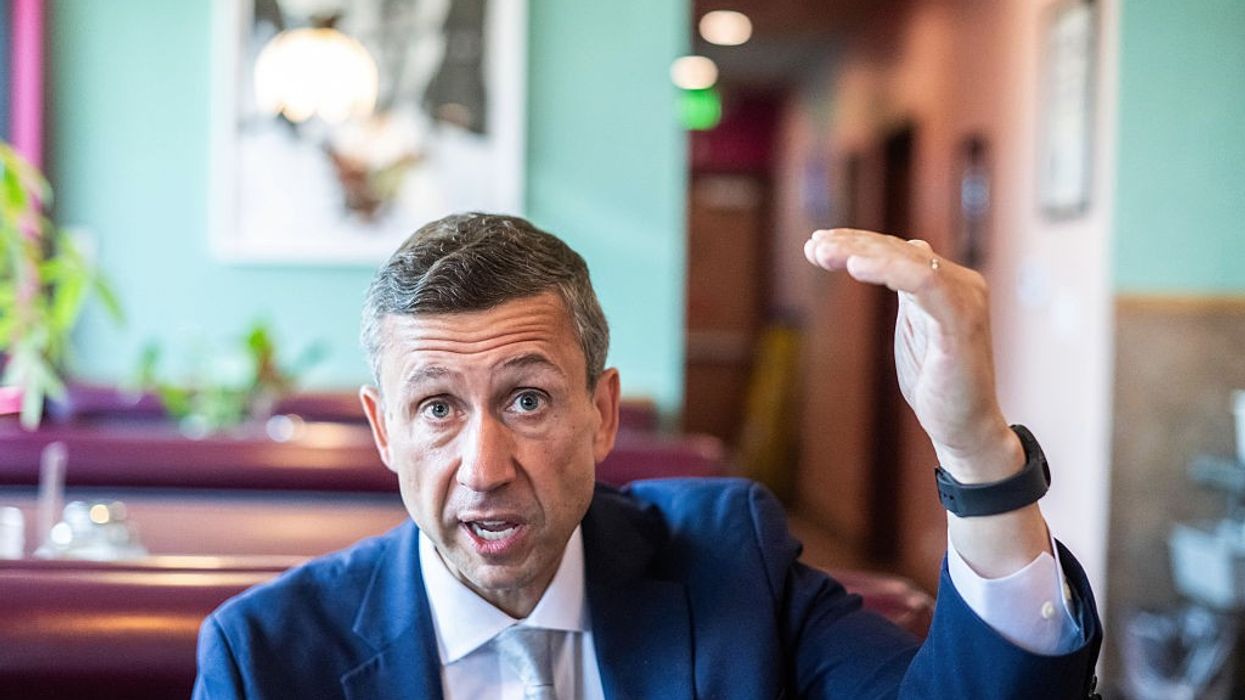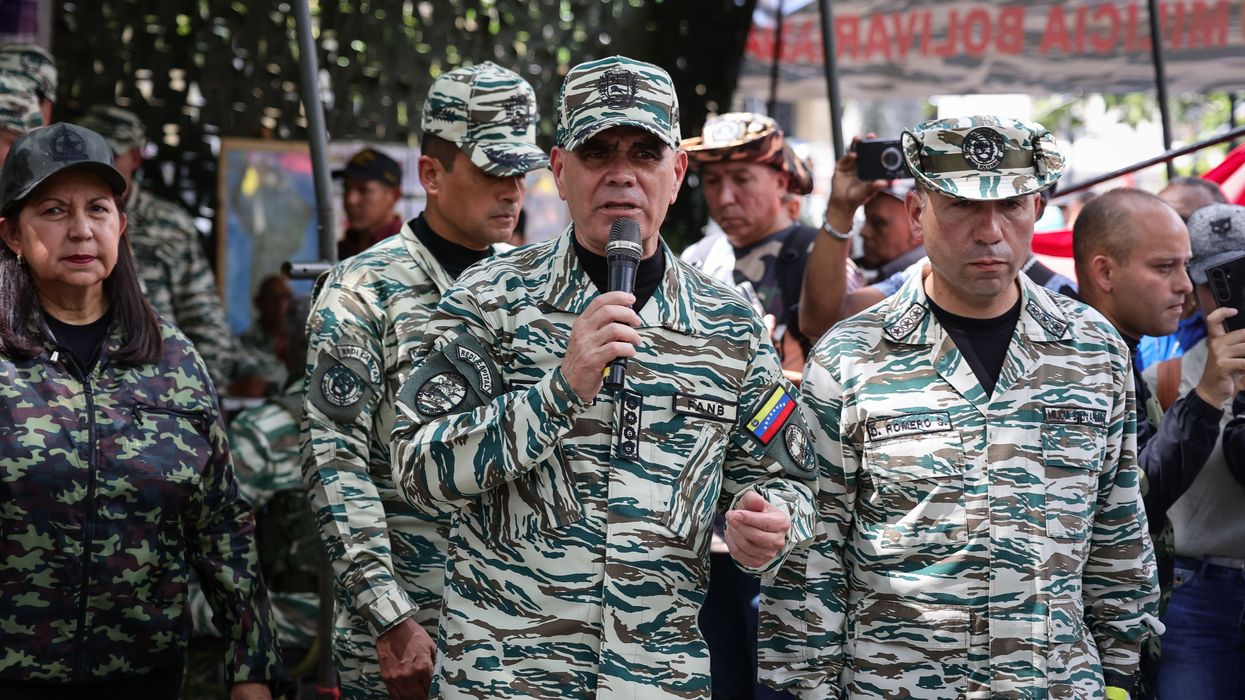November, 22 2017, 03:30pm EDT
Barred From Discussing Climate Change in Court, Climate Activist Who Shut Off Tar A Sands Pipeline in Montana Gets Felony Conviction
In a remarkably short trial in Montana's Chouteau County District Court lasting just a day and a half, a jury found Leonard Higgins, a retired Oregon state worker turned climate activist who shut off a tar sands pipeline to fight climate change, guilty of felony criminal mischief and misdemeanor criminal trespass. The conviction carries a maximum possible sentence of 10 years in jail and fines of up to $50,000. A sentencing hearing is scheduled for January 2.
FORT BENTON, Montana
In a remarkably short trial in Montana's Chouteau County District Court lasting just a day and a half, a jury found Leonard Higgins, a retired Oregon state worker turned climate activist who shut off a tar sands pipeline to fight climate change, guilty of felony criminal mischief and misdemeanor criminal trespass. The conviction carries a maximum possible sentence of 10 years in jail and fines of up to $50,000. A sentencing hearing is scheduled for January 2.
Higgins openly admits that on October 11, 2016, he cut two chains to enter a fenced enclosure around the Enbridge (formerly Spectra) tar sands pipeline in Coal Banks Landing, Montana, and turned the emergency shutoff valve. In fact, he and others called the company to alert them to obviate any safety problems, and a supporter filmed and livestreamed the action, after which they both waited to be arrested.
The case made national news. Higgins' action was part of a coordinated effort that simultaneously shut off tar sands pipelines in four states, temporarily halting all flow into the US of tar sands, which is the most carbon-intensive and climate damaging form of oil. In addition to being prosecuted in state court, Higgins and his fellow "valve turners" were recently the target of a letter signed by 84 members of Congress to the Justice Department, asking pointedly why it hadn't also prosecuted them under federal law, and whether their actions met the definition of domestic terrorism under the Patriot Act. Earlier this month Reuters reported the letter and the Justice Department's response "could escalate tensions between climate activists and the [Trump] administration."
But Higgins, a mild-mannered 65-year-old who says he acted out of conscience to help prevent climate harms for the sake of his children and grandchildren, was the opposite of confrontational. He expressed gratitude for his day in court and the chance to share his story and spend Thanksgiving with friends and supporters who attended the trial, "in such a beautiful place." He pleaded guilty to misdemeanor trespass and doesn't dispute the facts of what he did, but argues that the imperative to prevent climate harms justified his action. He was not permitted to make that argument in court, however.
"I'm happy for the opportunity to share why I had to shut down this pipeline, and I really appreciate the time and dedication of the jury and the judge," Higgins said. "I was disappointed and surprised by the verdict, but even more disappointed that I was not allowed a 'necessity defense,' and that I wasn't allowed to talk about climate change as it related to my state of mind. When I tried to talk about why I did what I did I was silenced. I'm looking forward to an appeal."
"We're disappointed that Mr Higgins was denied the opportunity to present a full defense and explain to the jury why he took his courageous action," said Kelsey Skaggs, Executive Director of the Climate Defense Project and member of Leonard's legal team. "Because of the fossil fuel industry's enormous influence, activists fighting for the future are being convicted while the real climate criminals walk free."
Before trial, Higgins and his defense team filed a motion with the Chouteau County District Court and a petition to the Montana Supreme Court asking permission to offer a "necessity defense," and argue before the jury that his action was necessary in order to prevent climate harms much more severe than the consequences of trespassing and turning the pipeline emergency valve. It would have allowed the defense team to bring in expert witnesses and evidence on climate change and the climate impacts of tar sands oil. Such a climate "necessity defense" was recently granted to Higgins' fellow valve-turners Emily Johnston and Annette Klapstein, whose trial is pending in a Minnesota court and in a similar case in Spokane, Washington.
But Judge Daniel Boucher, who presided in the trial, denied without a hearing Higgins' requests for a necessity defense, calling them a "mistaken attempt" "to place U.S. energy policy on trial." That ruling meant Higgins' jury was barred from hearing or considering evidence about the climate harms that motivated him.
In court, Higgins himself was also prevented from discussing climate change or explaining that he was motivated by the need to prevent climate harms. In fact, whenever he used the word "climate" in his testimony, the prosecutor objected and the judge sustained the objection.
So without using the word "climate," Higgins sought to convey that his action was a matter of conscience, answering a call he felt to do something effective to prevent the harms tar sands cause. "I began to reactivate in my church, and thought about what I could do to atone, frankly, for just paying attention to my own comfort and success," he said.
When asked by the prosecutor what he expected to be the repercussions of turning off the pipeline, Higgins responded, "Two things: to face the consequences, and to use this chance to talk about the problem."
By "the problem," Higgins means the problem of accelerating climate change and continued exploitation of carbon-intensive fossil fuels. In the wake of Standing Rock, more pipeline protests have sprung up nationwide, including against the Line 3 pipeline expansion in Minnesota, the Bayou Bridge Pipeline in Louisiana, the Trans-Pecos Pipeline in West Texas, the Diamond Pipeline in Memphis, the Sabal Trail Pipeline in Florida, and others. At the same time, the crackdown on the protests is intensifying. So far this year, several states have passed laws that would criminalize and toughen penalties for peaceful protest and non-violent direct action. Another 20 states are considering such measures.
That makes the trials of Higgins and his fellow climate activists important precedents. More such trials are coming, with more serious charges and penalties at stake. "As [more people] see examples of people putting aside the comforts and the complacency," said Higgins, "they'll feel the same compulsion, the same duty to take action, to do what's right."
In October 2016 activists under the banner of 'Shut It Down - Climate Direct Action' took the climate future into their own hands by shutting down all the tar sands oil flowing into the US from Canada.
LATEST NEWS
China Rips US ‘Warmongers’ as Trump Admin Proposes $11 Billion Taiwan Arms Sale
China's foreign minister warned that US weapons sales to Taipei "will only accelerate the push towards a perilous state of military confrontation across the Taiwan Strait."
Dec 18, 2025
The Chinese government on Thursday condemned the Trump administration's announcement of a proposed $11 billion weapons package for Taiwan, a move that Beijing said violates both the "One China" principle and an agreement in which the US pledged to reduce arms sales to Taipei.
The US State Department said the record $11.154 billion package contains a broad range of weaponry and other military equipment, including Lockheed Martin High Mobility Artillery Rocket Systems (HIMARS), Lockheed Martin Army Tactical Missile System (ATACMS) long-range missiles, BAE Systems M109A7 self-propelled howitzers, drones and tactical software, Javelin and TOW missiles, and M2A1 machine guns and other armaments.
"This proposed sale serves US national, economic, and security interests by supporting the recipient’s continuing efforts to modernize its armed forces and to maintain a credible defensive capability," the State Department said in a statement. "The proposed sale will help improve the security of the recipient and assist in maintaining political stability, military balance, and economic progress in the region."
Taiwanese leaders thanked the US for its continued efforts to help the island defend itself.
However, Chen Binhua, spokesperson for China's Taiwan Affairs Office, blasted the proposed sale as “flagrant interference in China’s internal affairs" that "severely undermines China’s sovereignty and security interests and sends erroneous signals to separatist forces."
Chen said that the arms package "gravely violates" the "One China" principle, which, to the US means that the People's Republic of China (PRC) is “the sole legal government of China," but to Beijing means that Taiwan—which it views as a breakaway province—is an inseparable part of the Chinese nation.
While the US acknowledges the PRC's position that there is but one China, Washington does not recognize or accept Beijing's stance. Although it has no formal diplomatic relations with Taipei, the US is obliged under the 1979 Taiwan Relations Act to "provide Taiwan with arms of a defensive character."
China says this directly contradicts US obligations under the so-called "Three Communiques" with Beijing—especially an August 17, 1982 agreement under which Washington pledged that it would respect PRC sovereignty and that it "intends gradually to reduce its sale of arms to Taiwan."
China has accused the US of violating the August 17 communique with each of its many arms sales to Taiwan.
"We urge the United States to immediately cease its policy of arming Taiwan and to stop condoning and supporting separatist forces advocating Taiwan independence," Chen said Thursday. "We urge the United States to exercise the utmost caution in handling the Taiwan issue.”
Chen added that US "warmongers" and Taiwan's ruling Democratic Progressive Party—which he accused of “stubbornly pursuing independence”—risk turning the island into a "powder keg" and the Taiwanese people into "cannon fodder."
Under pressure from the Trump administration to buy more US arms, Taiwanese President Lai Ching-te last month announced a special $40 billion budget for the purchase of weapons between 2026 and 2033.
The latest proposed US arms sale follows Congress' passage of the 2026 National Defense Authorization Act (NDAA), which authorizes up to $1 billion in funding for Taiwan's defense. US President Donald Trump is expected to imminently sign the record $900.6 billion bill into law.
Chinese Foreign Ministry spokesperson Guo Jiakun said Thursday that the US effort to contain China by arming Taiwan is "doomed to fail."
"It will only accelerate the push towards a perilous state of military confrontation across the Taiwan Strait,” he added.
Keep ReadingShow Less
‘Feckless’ Ken Martin Rebuked Over DNC Decision to Bury Autopsy of 2024 Election Disaster
"You can’t run as the party of democracy and transparency and then stick your own election autopsy in a drawer," said one critic.
Dec 18, 2025
The Democratic National Committee on Thursday drew strong criticism when it was revealed that the party's autopsy of its failures in the 2024 presidential election would not be publicly released.
According to the New York Times, DNC Chairman Ken Martin has decided against releasing the report because he "believes that looking back so publicly and painfully at the past would prove counterproductive for the party as it tries next year to take back power in Congress."
The decision to keep a lid on the report, however, is already sparking a backlash.
The New Republic's Greg Sargent argued in a Thursday piece that the decision by the DNC to bury the report "should unleash harsh criticism and recriminations" because it "could end up protecting key actors inside the party from accountability over the blown but winnable contest."
Sargent then pointed the finger at Future Forward, a super PAC that he said has earned a reputation for blowing large sums of money on ineffective television ads.
"Well before Election Day, the PAC came under harsh criticism from some Democrats who argued that it hadn’t spent sufficient money earlier in the campaign on ads attacking Trump," Sargent wrote. "Other Democrats charged that Future Forward’s ad-testing model and addiction to traditional TV ads led to anodyne communications and that its flawed theory of politics caused it to refrain from sufficiently targeting Trump, letting him avoid blame for his first-term disasters on Covid-19 and the economy."
Jeff Hauser, founder and executive director of the Revolving Door Project, told Common Dreams that Martin's decision to bury the report was part of a broader pattern of a lack of accountability for US elites, an issue that he said is becoming more important" as America gets less and less equal."
"Ken Martin seems determined to become the Merrick Garland of DNC Chairs," added Hauser, "a feckless amiable sort unwilling to take on the powerful people who scream out for stringent accountability. Democrats ought to re-center their entire party around holding elites, be they from Big Tech, the Democratic Party establishment, Big Oil, or Trump's kleptocratic regime, accountable."
Rotimi Adeoye, a columnist for MS Now and former communications strategist for the American Civil Liberties Union, also accused party insiders of trying to protect elites at the expense of rebuilding public trust with voters.
"This is also happening as Congressional Dems sit at a -55 net approval," he argued on X. "If your numbers are that bad and your response is to bury the autopsy, you’re basically telling voters the insiders get protection while the base gets lectures."
Adeoye added that "you can’t run as the party of democracy and transparency and then stick your own election autopsy in a drawer," and said that "if the DNC thinks the report would 'hurt the party,' that means the problems are real and political, not analytical—and that’s exactly why people want to read it."
Journalist Yashar Ali, meanwhile, sent out a message on Bluesky encouraging DNC staffers who have access to the report to let him publish it.
"If you have access to this DNC report, please send it to me," he wrote. "I will protect your anonymity."
While the DNC isn't releasing its own report documenting party failures in 2024, the progressive advocacy group RootsAction last week published an autopsy written by journalist Christopher D. Cook, who argued that former Vice President Kamala Harris' campaign made a major mistake by trying to court so-called moderate Republican voters and corporate donors instead of focusing on the struggles of working-class Americans.
"This was a preventable disaster," Cook said, "but Harris and the Democratic Party leadership prioritized the agendas of corporate donors and gambled on a centrist path, while largely abandoning working-class, young, and progressive voters."
Keep ReadingShow Less
'It's All About the Oil,' Says Venezuelan Defense Minister After 'Incoherent' Trump Claims
The minister also echoed Venezuelan President Nicolás Maduro's declaration that the US seizing oil tankers is "piracy."
Dec 18, 2025
As President Donald Trump continues his march toward a US war on Venezuela, the South American country's defense minister on Wednesday blasted his "delusional" and "completely incoherent" claims, and echoed warnings from around the world that "it's all about the oil."
In addition to killing nearly 100 people by bombing alleged drug smuggling boats, Trump has authorized covert Central Intelligence Agency action in Venezuela and repeatedly threatened attacks on land. Late Tuesday, Trump declared a naval blockade that he said will continue until the nation returns to the US "all of the Oil, Land, and other Assets that they previously stole from us."
Trump appears to be referring to the presence that US companies had in Venezuela before the country nationalized its oil industry in the 1970s. On Wednesday, the Republican president told reporters: "Getting land, oil rights, whatever we had—they took it away because we had a president that maybe wasn't watching. But they're not gonna do that. We want it back. They took our oil rights. We had a lot of oil there. As you know, they threw our companies out, and we want it back."
In a Wednesday speech, Venezuela's defense minister, Vladimir Padrino López, pushed back against Trump's blockade, threats of military action, and "delirious" claims that the country stole its own oil, land, and other assets from the United States. The minister also reiterated a declaration from Venezuelan President Nicolás Maduro that the US seizing oil tankers is "piracy."
As CNN reported, Maduro—whom Trump aims to oust from power—gave a similar speech about the US administration's purported goal of combating drug trafficking in Caracas on Wednesday.
"It is simply a warmongering and colonialist pretense, and we have said so many times, and now everyone sees the truth. The truth has been revealed," Maduro said. "The aim in Venezuela is a regime change to impose a puppet government that wouldn't last 47 hours, that would hand over the Constitution, sovereignty, and all the wealth, turning Venezuela into a colony. It will simply never happen."
According to Anadolu Agency, Venezuelan Vice President Delcy Rodríguez said on social media this week: "We will continue to be free and independent in our energy relations. Together with President Nicolás Maduro, we will continue to defend the homeland.”
Although the Republican-controlled US House of Representatives on Wednesday night narrowly defeated a pair of war powers resolutions aimed at reining in Trump's actions toward Venezuela, lawmakers from both major parties have also called out the administration's drug claims and argued against launching another US war for oil.
Responding to a clip of Trump's comments to reporters on Wednesday, US Rep. Gregory Meeks (D-NY), who sponsored one of the resolutions, wrote on social media: "I've said it many times before: This is not about drugs. If the goal were stopping narcotics, this administration would not be talking about oil rights or seizing tankers. That is not a lawful basis for war."
Rep. Thomas Massie (R-Ky.), one of the few Republicans who supported the resolutions, took to the House floor ahead of the votes on Wednesday to denounce Trump's march toward an unconstitutional war and declare that "this is about oil and regime change."
Keep ReadingShow Less
Most Popular


